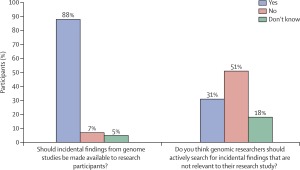Getting to know you
17 December 2014
By Anna Middleton
By Anna Middleton

People want data but do not expect researchers to deliver results if this compromised their research. Credit: DOI: 10.1016/S0140-6736(14)62119-X
In 2010, when the Deciphering Developmental Disorders project began screening patient genomes, we began talking to scientists, clinicians and patient families to uncover potential ethical issues. It was always our intention that the genetic data relevant to the patient’s developmental disorder would be shared with patient families as this, the diagnosis they had often waited years for, was the driving force of the whole project. What though, of the rest of the genome? In those billions of letters of genetic code that don’t tell us about the patient’s specific disorder there may lurk genetic variants that can drive tumour development or increase susceptibility to other diseases.
We made the decision for this research to report back only pertinent findings. But was that the right decision? To find out, we had to ask all the relevant stakeholders for their views; a challenging task when you consider that we wanted to know people’s opinion on very new and complex scientific methods.
We created an online survey that contained 10 short films to describe the ethical issues raised by sequencing technologies. The survey went viral and we had just under 7,000 responses from 75 different countries. It has since been translated into Danish and Spanish by other research groups to be used with different poputlations. The response we received from the public, health professionals and scientists round the world was clear: most thought that important health implications discovered accidentally in the process of answering a research question should be reported to the participant.
However, what was also clear was that participants did not expect researchers to deliver such results if by doing so this compromised the ability to conduct their research. This indicates a very common sense approach – people want data. But they don’t believe it should be delivered to them at all costs. A more detailed breakdown of the survey results can be foundhere.
Engaging with the public, health professionals and scientists about how genetics is likely to shape healthcare and asking everyone to play a part in these major decisions is incredibly important. As research develops and the capabilities of genomic sequencing increase, we will need to continue this conversation.
Anna Middleton is a social scientist and registered genetic counsellor researching ethics and genomics at the Wellcome Trust Sanger Institute.
References
- Middleton A et al (2014). No expectation to share incidental findings in genomic research.The Lancet. DOI: 10.1016/S0140-6736(14)62119-X
Related Links:





















.png)









No hay comentarios:
Publicar un comentario